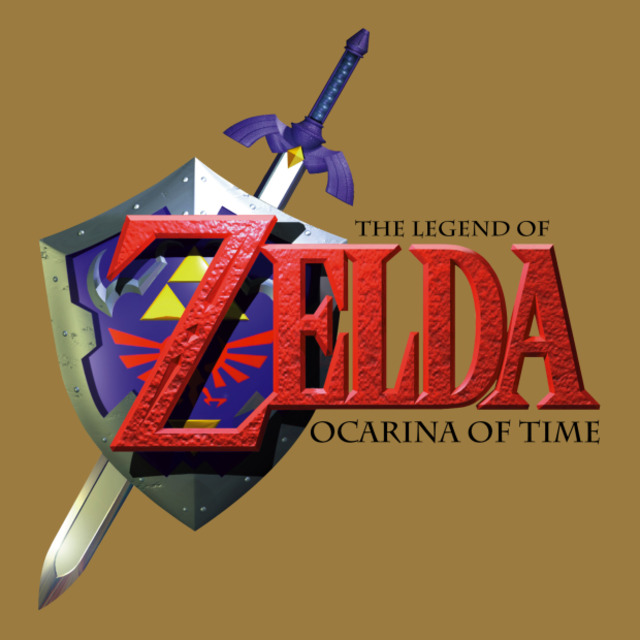Defining a Classic
It is hard to look at a game almost eleven years after it's release, and say something new that has not been said already. It is hard even define what makes a game like Ocarina of Time so memorable, so fantastic to gamers and reviewers alike. Not only is this the return of one of the greatest franchises in history, but it is arguably one of the greatest games ever conceived.
IT is one of the timeless stories ever; rescuing a princess and embarking on an epic quest against the forces of evil, but Nintendo had the great foresight to make the game drip with presentation, pretty much wowing everyone on the games design and execution. Despite a few minor camera quips, the control is near flawless. The option of the z-targeting and the easy interface with the c buttons pretty much set a standard for 3-D action/platformers, which added great fluidity to the combat aspects and solving puzzles. Speaking of that, the puzzles are well planned, and the enemies are vast and great to tango with. Not to mention some of the greatest boss battles ever conceived, ranging from the nearly impossible Morpha, to the crafty Bongo Bongo, and fighting Shadow Ganon before the real thing was a great hint to what was to come.
The game also has some of the best dungeons ever conceived. I still shudder trying to get through the water temple, one of the most advanced ideas for a dungeon I have ever seen, and probably ever will. To this day, I know many gamers who have yet to conquer it without looking a guide, and that says something about the games overall design. It's difficult enough to be a challenge, yet never frustrating to the point of giving up. The Forest temple is a close second, as well as the clever design of places like Jabu-Jabu's belly and the Ice Caverns make it worthwhile to explore and take in the atmosphere the game presents.
And explore you shall, because the game has great hidden treasures throughout Hyrule. the grottos all over the map are well hidden, and for years were debated if they were the hiding places of heart pieces, gold skullatas, or the fabled Triforce, which to this day, is debated if it is in the game or not, even though it is fairly obvious it will never be seen. Adding to these secret areas is the overall presentation of the game's design. The quick cinematic introducing Hyrule Field is just one example of this, showcasing a massive, seamless landmass which lets you explore every nook and cranny of the landscape. Once again, fantastic design.
The game also sports a lot of mini-activities, from fishing, to horse-racing to bombachu bowling. They even have some side quests thrown in the mix, such as the quest for the biggoron sword, the longest sword in the game, or the Poe quests, which add some depth to the single player experience.
Lastly, the whole concept of time in the game is well utilized. Townsfolk and people in the present are affected by the future, when Gannondorf takes over, and the environments are affected in numerous ways to solve the world puzzles, such as unfreezing the Hyrule Lake and refilling it with water, dealing with the Gerudos as an adult, when you can't even access the area as a child, and saving the Deku Tree by gathering his seedling in the forest temple, all part of the overarching story that makes the game more than just a typical quest, but something that affects every facet of the world. It truly is a great experience to play and watch, and to interact with what would otherwise be just background characters in any other adventure.
As far as the graphics go, the only bad spot I can think of is the blurry marketplace, but everything else is sharp and crisp by N64 standards. Age has made it look a bit cruder, but despite that, they are still marvelous to look at. Very few games today have a wide open space like Hyrule Field, for example. This was, until the next generation, the largest free zone in the existing video game world. Oblivion blew it away, but its scale is only the tip of the iceberg of the graphical capabilities of this game. And considering it is on a cartridge format, which at the time was definitely inferior in terms of space than disks, this is a technical feat. True, some parts were weak, such as marketplace mentioned before, but that can be overlooked as minuscule details into the grander picture. Each dungeon and grotto, puzzle piece and weapon, enemy and item, is crafted with detail, and are, frankly, just enthralling to experience.
Despite being a cartridge game, the sound's pretty good. The normal music has some of the most memorable medleys to grace a video game, from the earthy, chilling sounds of the Forest Temple, to the upbeat flutes of the Lost Woods. Some are catchy and energizing, such as Gerudo's Valley, while others are heartwarming and somber, such as Zelda's Lullaby, but all tell a story without words, all these songs give ambiance to the game itself. True, there are no voices in the game, but they can be overlooked because the background music is so good, it doesn't matter if voices are missing or not. This is one example where the games music not only enhances the experience, but drowns out all negative flaws as well.
So how do you define a classic? It is hard to put it in words, be it a review or a speech, but in the end, it is something that everyone can feel. Legend of Zelda, Ocarina of Time is the perfect example of a near perfect game. It's almost as timeless as it's gameplay, and will forever be considered a pinnacle in the video game world.
